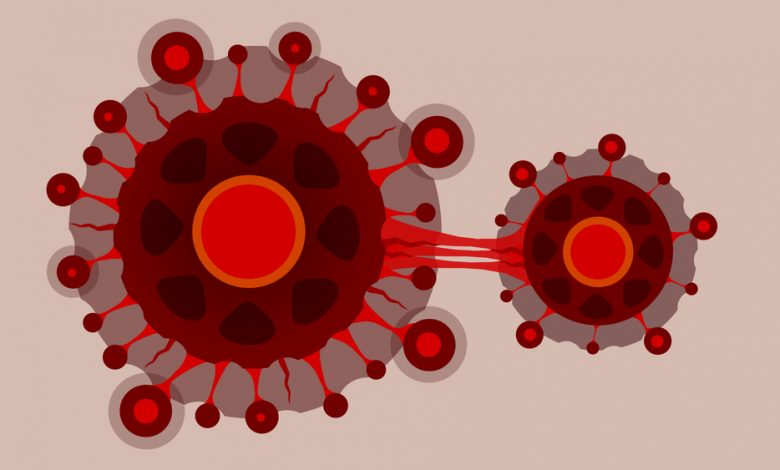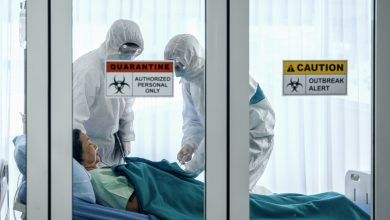
Recent reports have suggested that COVID-19, better known as the novel coronavirus, has potentially mutated and become more “aggressive.” Given that people were already worried about the original version, many are wondering if they should be more worried about mutations. The short and simple answer is that this new strain is nothing much to worry about.
Table of Contents
Coronavirus Mutations: Don’t Panic Just Yet
The claims that the coronavirus has mutated are indeed true, but there’s nothing inherently wrong with that. Before you go out and buy even more toilet paper, take a deep breath and listen. The word “mutation” is thrown out all the time to refer to a drastic shift in the makeup in something. Mutations are all over popular culture as doing just that, from the X-Men to the Ninja Turtles. However, the fictional portrayal of mutation and the reality of mutation are two very different things. Real-life mutations are often very small and innocuous things. It is wrong to suggest that the virus mutating is a cause for concern and panic, especially when the last thing we need right now is more people panicking.
One of the most pressing concerns with epidemics is the question of whether the pathogen – the virus in question – will mutate and become more dangerous. This isn’t the right question to be asking right now. A mutation is just one of the mundane things at the heart of most viruses, including coronavirus. The genetic makeup of a virus like this is RNA and not the DNA found in humans. RNA mutations are not perfect. RNA doesn’t “proofread” it’s work like DNA does, so to speak. Because these RNA mutations aren’t foolproof, RNA can make mistakes, known as mutations. Viruses are known to mutate rapidly compared to other organisms.
Most Virus Mutations Are Not Dangerous
The idea of viruses mutating faster sounds scary, but the truth is that many of these mutations are complete accidents. Some of them are entirely harmless, and some of them actually do damage to the pathogen instead of making it more durable. Neutral mutations can cause no discernible differences in how the virus affects and potentially harms people. Mutations that damage the virus doesn’t survive very long due to natural selection.
The good news is that even mutations that benefit a virus are nothing to lose your hair about. These mutations don’t make much of a difference to an outbreak. Viral traits such as severity and infectiousness are controlled through multiple genes. Each of those genes can have various effects on the virus. For example, viruses that cause severe symptoms can’t be transferred if people become so sick they never leave their bed. Think of a virus as being like a Rubik’s cube; changing one trait means changing the whole thing. The odds of a virus being able to navigate everything and “solve” the cube – particularly in the relatively short timescale of outbreaks and epidemics – is low. It’s so low it’s barely worth thinking about.
Will a Coronavirus Mutation Create a Resistance to Vaccines?
With that said, there are concerns that further mutations would render a coronavirus vaccine ineffective. While it’s true that viruses can mutate to become more resistant to vaccines, the process takes years. The virus has to luck into the right combination of mutations. Vaccines to RNA viruses like this, such as measles and yellow fever, were created during the 1930s and are still very effective. Those viruses all mutate faster than the coronavirus does, yet we still have effective vaccines. In fact, the main difference between the two strains of coronavirus – dubbed “L” and “S” – are two small mutations. The viruses are still 99.993% similar in nature. A vaccine for one strain will almost definitely work against the other. The reason that we need to develop new influenza vaccines continually is due to the constant, constant reshuffling of the virus’s genome. The flu doesn’t mutate; it just put on different clothes, so to speak. Coronavirus and influenza are also two very different diseases, and you shouldn’t compare one to the other.
Some of these virus mutations can prove to be important in the long run. It’s likely that the virus mutated in such a way that it could transfer from bats to humans. Similar things have happened with HIV that allowed it to spread from chimpanzees to humans. During the West African Ebola crisis, the virus may have mutated to become more adept at infecting humans. However, saying that any mutation that occurs to a virus is going to impact public health requires a lot of experimentation and investigation that isn’t possible during such a fast-moving outbreak like this. Scientists can only make speculations about what a mutation may do. Any of these preliminary conclusions are not to be taken as fact. These conclusions certainly shouldn’t take away from the larger conversation of establishing effective public health responses to the coronavirus, or indeed any other virus.
What We Should Be Worried About Is Misinformation
We’ve seen how this can have an impact in the past. Making generalizations about viruses has been shown to be baseless and potentially dangerous. There was a controversial study published in Science that suggests a mutation in the Zika virus caused microcephaly in newborn children. When India was hit with a Zika outbreak in 2018, the government said that the virus wasn’t harmful to fetuses because it didn’t have this new mutation that supposedly hurt newborns. This misconception likely led to pregnant women becoming complacent about the virus, and the situation was worse than it should have been. It’s true that the claim coronavirus has become more aggressive could be academic, but baseless speculation could negatively impact health policies. Misinformation and human stupidity often end up being more dangerous than the virus itself during an epidemic.
Rather than being worried about unlikely outcomes, it’s better to focus on what we do know and come up with realistic ways to challenge COVID-19. Getting clear information from scientists and governments is going to be the key to keeping the public’s trust and creating effective public health recommendations. Any such policies must emphasize the health and wellbeing of vulnerable members of society, such as older adults. Policymakers should also look at improving the healthcare infrastructure and make it easier for communities to test for the virus and respond accordingly.
This Too Shall Pass
With any luck, this whole mess will show us that we must be better prepared for any future epidemics. It’s become apparent that barely anyone was prepared for what has happened. Instead of being worried about mutations, let’s all come together to focus on creating policies to prevent the virus from spreading and take care of people who have coronavirus or are at risk of developing it.





Leave a Reply
Thank you for your response.
Please verify that you are not a robot.